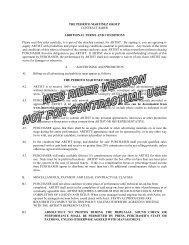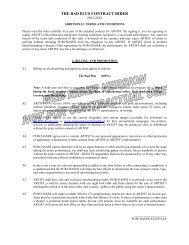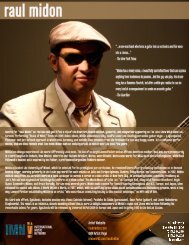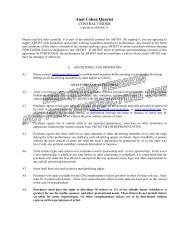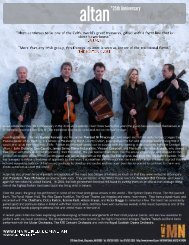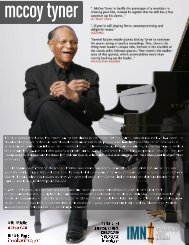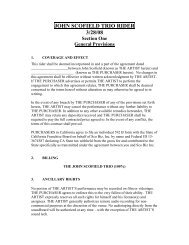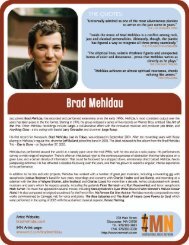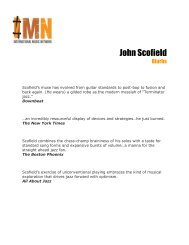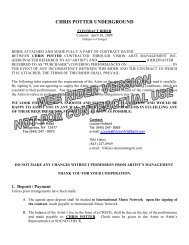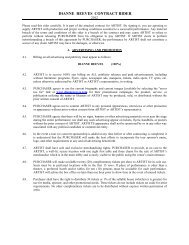Yousssou N'Dour - International Music Network
Yousssou N'Dour - International Music Network
Yousssou N'Dour - International Music Network
Create successful ePaper yourself
Turn your PDF publications into a flip-book with our unique Google optimized e-Paper software.
<strong>Yousssou</strong> N’Dour<br />
Rokku Mi Rokka (Give and Take)<br />
2007<br />
With Rokku Mi Rokka (Give And Take), Senegal’s king of mbalax continues the journey deep inside the<br />
traditions of his country that began with the release of Nothing’s In Vain and the Grammy-winning<br />
Egypt, the two albums now considered his most remarkable achievements to date. More than 25 years<br />
into a career that scaled heights once unimaginable for African music, he is still setting the pace for all<br />
artists in West Africa.<br />
“What keeps me passionate about music is the freedom I have,” he says. “The freedom to use<br />
different sounds and find different vibes. I started my professional life interpreting Cuban music, then<br />
I sang mbalax and pop, and I think that if I had stayed in one style I would have got a little tired. But,<br />
you know, I also have a reputation for bringing something new to the world outside Africa.”<br />
Born in 1959, Youssou first achieved fame as a twelve-year-old who sang at religious ceremonies; by<br />
sixteen he was a de facto star, singing with one of the most popular bands of the 1970s, Etoile De<br />
Dakar. In the 1980s, as leader of the Super Etoile, he developed a new African form of music known<br />
as mbalax. “The problem for some people is that mbalax is a complex music. If you don’t know our<br />
language, Wolof, or our culture, you will get confused, you won’t understand the references. So I had<br />
to take a decision to make it easy for people to understand me. I want to communicate with<br />
everybody.”<br />
With the global hit single “7 Seconds”, Youssou achieved his goal of reaching out to the whole world.<br />
“It opened doors for me and for my music,” he smiles, “It was a magical opportunity.” But with the<br />
planet waiting for another “7 Seconds”, he turned his back on making pop records and drew his new<br />
audience into the world of traditional Senegalese music (on Nothing’s In Vain, released in 2002) and<br />
spirituality (on Egypt, a collaboration with the Fathy Salama Orchestra, released in 2004).<br />
On Rokku Mi Rokka, he continues his adventures in traditional music, but with a twist. “The music and<br />
inspiration on this album are from the north, from the desert, from parts of the country that border on<br />
Mali and Mauritania. People from those countries will know and understand this music as well as<br />
people who come from the centre of Senegal.<br />
“Some people might think Senegalese music means mbalax, which is Wolof, the most important<br />
language in the country, everybody speaks it. But all my life I have been saying that this is not the<br />
only music we have in Senegal, we have a wide range of sounds and rhythms. When it came to writing<br />
the songs for this album, I wanted to use different sounds.<br />
“Sometimes you will hear a little blues on the album, a little reggae, a bit of Cuba. In Africa, we get<br />
excited when we hear these rhythms, because we feel them, they are ours, but they left Africa with<br />
the slaves a long time ago. Rokku Mi Rokka means ‘You give me something, I give you something’ and<br />
that’s the message of the album: we have received a lot from the developed world, but remember<br />
that we brought a lot, too.”<br />
It’s this interaction between two worlds that intrigues N’Dour in 2007. Last year, he appeared in his<br />
first Hollywood movie, playing the freed slave Olaudah Equiano in the film Amazing Grace, which told<br />
the story of William Wilberforce’s efforts to abolish slavery. “When I read Equiano’s autobiography, I<br />
understood that he and I are trying to do a lot of the same things. A lot of the African story about the<br />
abolition of slavery remains untold.”
In 2005, he was the sole African to sing on the London stage of Live 8, where he performed “7<br />
Seconds” with Dido before taking a helicopter to appear at the Cornwall concert, and then a<br />
plane to the Paris show. “There was a real misunderstanding in the organisation of those<br />
concerts. I think people like Bob Geldof and Bono now know they would have to involve<br />
African musicians if there was another project like this.” But if Live 8 cemented Youssou’s<br />
position as the most important African musician of his time, there have been growing rumours<br />
that he considering moving into politics. “No, I don’t need to be a politician. A lot of problems<br />
in Africa are caused by people getting important political positions when they are not<br />
experienced politicians. I’m involved in justice, in human rights: what I’m doing is more than<br />
politics and I’m doing my best while following my passion, my music.”<br />
And so, in 2006, Youssou returned to Xippi Studios. “We recorded about 20 songs and then we<br />
had to decide how to mix them. It’s crazy, but Africans like the sound of keyboards and<br />
modern instruments, the rest of the world wants Africa’s traditional instruments, but<br />
audiences in Africa won’t react to the music unless we use modern instruments. The only thing<br />
both audiences like is lots of space for my voice. I have to mix the songs not to sell, but to<br />
deliver them to different audiences, so there is an African version and one for the rest of the<br />
world.”<br />
To ensure the necessary authenticity in the songs he was writing, Youssou sought out Bah<br />
Mody, one of the north’s most popular singers. “Next year, I’m going to help him record his<br />
own album, I really want people to hear what he can do. We had this great feeling going<br />
between us, the direction we took is the result of real teamwork.”<br />
For the music, Youssou returned to the band he helped form a quarter of a century ago, the<br />
Super Etoile, and old friends Habib Faye (bass), Babacar “Mbaye Dieye” Faye (percussion) and<br />
Papa Oumar Ngom (guitar), who have been part of Youssou’s journey for more than 20 years.<br />
“They are not from the north, but they are Senegalese, they understand exactly what is<br />
happening in the north, the south and the centre. What I believe is that the instruments are<br />
not the important thing. What matters is the expression. I can choose from a lot of great<br />
musicians when I record, but these guys understand how to express what I am looking for.”<br />
There are a few addition to the team, however. The Malian musician Bassekou Kouyaté,<br />
previously best know as a member of Ali Farka Touré’s band, adds ngoni, a four-stringed<br />
ancestor of the banjo, to Sama Gàmmu. The same song also features the voice of Ousmane<br />
Kangue a singer from the north, described by Youssou as simply “great, like Baaba Maal”.<br />
Additionally Balla Sidibe and Rudy Gomis of Orchestra Baobab, who were in N’Dour’s studio<br />
recording their album on the day he recorded this “Xel”, sing on that track.<br />
The return of Neneh Cherry, who duets with Youssou on “Wake Up (It’s Africa Calling)”, was a<br />
definite highpoint of the sessions. “Neneh and ‘7 Seconds’ have been a huge part of my career<br />
since 1994, and we kept a connection. She looks like my sister, and we were these people<br />
from Africa who were delivering a message to the world. We’re not trying to have another ‘7<br />
Seconds’ as this is a much more African-sounding song, featuring our instruments, such as<br />
kora. Neneh really liked the vibe we had. We come from the same continent and have a<br />
message.<br />
“<strong>Music</strong> is a language, maybe the first language, and I use it to deliver a message because<br />
people can hear it and understand it first, quicker than if they waited for a newspaper. I sing<br />
about reality, about my society, which is more than just Senegal or Africa. I sing about the<br />
world.”<br />
http://www.imnworld.com/youssoundour<br />
http://www.youssou.com/<br />
2
YOUSSOU N’DOUR - ROKKU MI ROKKA (GIVE AND<br />
TAKE)<br />
WHAT THE CRITICS SAY<br />
‘The third in a brilliant run of LPs steeped in traditional music. He’s rarely sounded more<br />
content. * * * *’<br />
Mojo<br />
'For the past 13 years, the Senegal star has been synonymous with one record. This LP<br />
should alter that. This adventurous and extraordinary album feels like a new pinnacle in<br />
Youssou's career. Blissfully good. * * * * *'<br />
Observer <strong>Music</strong> Monthly<br />
‘N’Dour hits the spot with an album of joyous songs. Outstanding. * * * * *’<br />
BBC <strong>Music</strong> Magazine - November World <strong>Music</strong> Choice<br />
‘Africa’s biggest singing star returns to his roots. It’s the record many have been urging him<br />
to make for years. * * * *’<br />
Uncut<br />
‘His best release in ages. A vibrant and cohesive piece of work. A genuinely good African pop<br />
album, which revels radiantly in its Senegalese roots.'<br />
fRoots<br />
‘The Senegalese superstar's rootsiest release for ages. The album is <strong>N'Dour</strong>'s best for years.<br />
* * * * *’<br />
Financial Times<br />
‘The most Senegalese-sounding of his international releases in a long time.’<br />
Songlines - Senegalese Sounds: Must-Own Classics<br />
‘A good, stripped down African album that showcases a whole new rhythmic armoury. At the<br />
centre of everything is his incredible voice -<br />
a thing of wonder throughout.’<br />
Jazzwise<br />
‘His most nimble and exciting album in years. The approach is acoustic and exuberant, the<br />
instrumentalists dazzle. Champion.’<br />
Observer
‘Rokku Mi Rokka captures this versatile artist/ producer in his prolific prime. Great music on a<br />
global scale. * * * *’<br />
Metro<br />
‘One of Africa’s greatest voices has found a fresh, sparking new direction.’<br />
<strong>Music</strong> Week
Los Angeles Times<br />
December 3, 2007<br />
WORLD MUSIC REVIEW:<br />
Grooving to the beat of <strong>N'Dour</strong><br />
The Senegalese star's wild rhythms have 'em dancing in the aisles at Royce, rules or no rules.<br />
By Don Heckman<br />
Special to The Times<br />
There's always a full house for Youssou <strong>N'Dour</strong>'s performances, and Saturday night was no<br />
exception at UCLA's Royce Hall. The Senegalese singer-composer, a global superstar, was<br />
greeted by a capacity crowd and a huge surge of applause as he strolled onstage to the<br />
irresistible rhythms of his 10-piece Super Etoile de Dakar ensemble.<br />
Or, at least, seemingly irresistible. <strong>N'Dour</strong> must have been startled when the crowd -- despite<br />
the whoops and shouts of enthusiasm -- initially seemed physically unresponsive to the<br />
visceral blandishments of his mbalax style. After two or three numbers, he took matters into<br />
his own hands, saying: "Don't you want to dance? Come, you can dance."<br />
That's all that was needed to release the genie from the bottle. In a flash, the area in front of<br />
the stage was filled with animated Terpsichores, arms and legs moving wildly in all directions,<br />
the hall's usual restrictions against filling the aisles shoved aside by the sheer ebullience of the<br />
moment. That was pretty much the last time most of the crowd remained seated.<br />
The sheer vitality of <strong>N'Dour</strong>'s music almost demands physical movement, and if it wasn't<br />
possible to participate in the vibrant choreographic displays taking place in front of the stage,<br />
there was plenty of room for in-place grooving.<br />
<strong>N'Dour</strong> responded to this rush of ardor by dialing up the already dynamic intensity of the<br />
music. A chattering, talking-drum solo by Assane Thiam was the first trigger, followed by a<br />
kinetic exhibition from a pair of <strong>N'Dour</strong>'s own athletic dancers, offering an authentic template<br />
for the eager aficionados in front of the stage. Stirring guitar solos from the cool but powerful<br />
Mamadou Mbaye and a torrent of propulsive rhythm from the four-man percussion team<br />
sustained -- and increased -- the exhilaration of the performance.<br />
<strong>N'Dour</strong> played selections from across his varied career, and the music illuminated the essence<br />
of his belief -- underscored in the title of his recently released CD, "Rokku Mi Rokka (Give and<br />
Take)" -- in the back-and-forth between contemporary African music and the Western<br />
Hemisphere sounds and rhythms created by African slaves. The mixture was constantly<br />
compelling -- traces of reggae, calypso, blues and Cuban rhythms, blending seamlessly with<br />
<strong>N'Dour</strong>'s soaring melodies, call-and-response vocalizing and surging traditional rhythms.<br />
Ultimately, the majority of the audience -- aside from those who had listened closely to his<br />
recordings -- probably had little comprehension of the literal subtleties of <strong>N'Dour</strong>'s lyrics. But<br />
the sheer quality of his voice, capable of delivering an astonishing range of sounds and<br />
timbres, combined with Super Etoile's blend of ensemble craft and spontaneous energy, was<br />
more than enough to thrust aside any barriers of language and culture.<br />
And that capacity to reach out to listeners in the most primal fashion, to engage them -- as he<br />
did with an impassioned call to deal with the spread of HIV-AIDS -- in his own universe of<br />
feeling and concern, is what makes <strong>N'Dour</strong> and his music true representatives, not just of<br />
Africa or the globe but of humanity itself.
about:blank<br />
To print this page, select "PRINT" from the File Menu of your browser.<br />
Posted: Sun., Dec. 2, 2007, 2:11pm PT<br />
Youssou <strong>N'Dour</strong><br />
(Royce Hall; 1800 seats; $60 top) Presented by UCLA Live. Reviewed Dec. 1, 2007.<br />
Band: <strong>N'Dour</strong>, El Hadji Faye, Assane Thiam, Papa Omar Ngom, Ablaye Lo, Moustapha Faye, Birame Dieng,<br />
Mamadou Mbaye, Habib Faye.<br />
By STEVEN MIRKIN<br />
When, six songs into his 18-song set Saturday night, Senegalese superstar Youssou <strong>N'Dour</strong> asked to<br />
see some dancers, his audience took the invitation seriously. First a trickle, then a stream of (mostly)<br />
women -- including toddlers dragging their mothers -- ecstatically made their way down the aisles to<br />
the foot of the stage to writhe in ways that the human body was not designed to writhe. Soon the<br />
entire sold-out Royce Hall audience was on its feet.<br />
From that moment, the show -- which was already pretty impressive -- turned from a simple concert to a celebration.<br />
The band's playing became looser, the grooves airier; the song structures less formal and more elastic. The one-chord<br />
vamps stretched out indefinitely, the harmonies changing as the two guitars, bass, keyboards, Assane Thiam's<br />
expressive talking drum and three percussionists shifted, like gears, into different musical patterns. "Bandiene"<br />
increased speed so precipitously, it threatened to take off; "Set" turned a corner, moving from sprightly to thunderous,<br />
with a slight change in the guitar line. It's a sound that reflects the title of his new Nonesuch album, "Rokku Mi Rokka<br />
(Give and Take)."<br />
<strong>N'Dour</strong>'s voice turned more urgent with the aud's enthusiastic reaction, wringing waves of emotion with a repeated<br />
"Senegal" at the end of "Immigrés" and breaking out a precise, aching soprano during "Birima." He can rally like a<br />
trumpet, cajole like a tenor sax and add the grave authority of a French horn. You don't have to speak Wolof to<br />
understand why he has been named one of Time Magazine's "100 Most Influential People."<br />
He carries such conviction that the aud stayed on its feet even during a heartfelt speech -- read off a page --<br />
recognizing World AIDS Day, and asking the aud to write representatives to help not only the battle against AIDS, but<br />
malaria. It was followed by the brooding prayer, "New Africa," its swelling keyboards reflecting the influence of Peter
Gabriel. Other influences could be heard throughout the night -- Paul Simon (who collaborated with <strong>N'Dour</strong> on<br />
"Graceland") on "Baye Fall," and some North African arabesques on the love song "Letema," but <strong>N'Dour</strong> avoids the<br />
bland diplomacy of "world music." No matter what style he plays, his music remains identifiably his own.<br />
Read the full article at:<br />
http://www.variety.com/story.asp?l=story&r=VE1117935555&c=34<br />
Like this article? Variety.com has over 150,000 articles, 40,000 reviews and 10,000 pages of charts. Subscribe today!<br />
http://www.variety.com/emailfriend<br />
or call (866) MY-VARIETY.<br />
Can't commit? Sign up for a free trial!<br />
http://www.variety.com/emailfriend<br />
© 2007 Reed Business Information<br />
Use of this Website is subject to Terms of Use. Privacy Policy<br />
… _
Ottawa Citizen<br />
November 8, 2007 Thursday<br />
Final Edition<br />
It's hard for <strong>N'Dour</strong> to please fans at home and abroad; Westerners want<br />
'pure' African music, Senegalese prefer more modern sound<br />
By Peter Culshaw, The Daily Telegraph<br />
The man opposite me in a London hotel looks like a dapper businessman but he's been<br />
described by Rolling Stone as "perhaps the most famous singer alive," by Time as one of the<br />
planet's 100 most influential people, and by Peter Gabriel as having a "voice of liquid gold".<br />
I'm talking with Senegal's Youssou <strong>N'Dour</strong> about his unique cultural position as a bridge<br />
between the West and Africa. We discuss the street scene in Dakar, Senegal's capital, where<br />
the tourist market has ethnic rugs and drums, while the Senegalese go to the market next<br />
door to buy iPods and posters of Madonna. The locals and the outsiders both have a powerful<br />
fantasy of the other, a cultural dynamic that often makes life uncomfortable for <strong>N'Dour</strong>.<br />
"More and more these days, the rest of the world loves music from Africa that is pure,<br />
traditional and powerful, whereas the Senegalese always want me to do something modern,<br />
with keyboards and guitars."<br />
His new album, Rokku Mi Rokka, sees him leaning toward the modern but his previous,<br />
acoustic, album, Egypt (2004), highlighted the dilemma. Listeners outside Africa adored the<br />
record. It sold well over 100,000 copies and picked up a Grammy, a Mobo and a Radio 3 World<br />
<strong>Music</strong> Award.<br />
"The album wasn't initially liked at all in Senegal -- although they were proud when it<br />
achieved such acclaim, and then they started listening to it."<br />
It's not always easy to be in his position, he says. He was criticized for his role in the 2006<br />
film Amazing Grace, which chronicled William Wilberforce's efforts to end slavery. <strong>N'Dour</strong><br />
played the small part of African abolitionist Olaudaqh Equiano. It was seen by many as<br />
tokenistic, as was his appearance at Live 8, which didn't feature other African artists on the<br />
main stages.<br />
"It's difficult. With these situations I usually think it's better to do something than nothing.<br />
People think that because I'm well known I could have changed how a Hollywood film was<br />
made, but that's not true."<br />
He says the experience has made him more interested in producing a film in Senegal<br />
himself. As far as Live 8 goes, he now says "If they do something like that again without<br />
Africans -- which was a mistake -- I'm not the one who's gonna step in."<br />
Now 48, <strong>N'Dour</strong> has been in top Senegalese bands since the age of 14, when he joined the<br />
Star Band, which played the popular Cuban-influenced music of the time. By the early 1980s,<br />
he was forging a new style, mbalax, which incorporated more traditional Senegalese elements,<br />
in his group Super Etoile de Dakar. The only initial problem was the opposition of his father, a<br />
designer.<br />
"It was a difficult time, but he eventually gave his authorization to me to be a musician."<br />
His father is still a big influence and keeps him from becoming arrogant: "It's very difficult<br />
to see my father if I've done anything bad."<br />
<strong>N'Dour</strong> has seven children. The eldest is 22 and studying for an MBA in the United States.<br />
How would he react if one of his children announced he or she wanted to be a musician?<br />
"I would say it's a difficult path, but if they had a big talent, why not?"<br />
<strong>N'Dour</strong> rather downplays his business empire: "I have a radio station, which I hope to be a<br />
place to encourage democracy and liberty, and a club. But they still lose money."
He is more proud of his work combating AIDS and malaria in Senegal. There are many<br />
who have said he should run for president of the country, but he says, "I think I'm in a better<br />
position where I am. I can support and sometimes denounce. To be a politician you have to<br />
learn to lie -- to be an artist you have to be honest."<br />
Since his biggest hit, Seven Seconds, the 1994 duet with Neneh Cherry, some of his<br />
records have seemed over-produced, as labels have attempted to replicate the single's millionselling<br />
success.<br />
"I've learned enough to produce myself," he says, and tells me he's happier on his current<br />
label, Nonesuch, which is more of a boutique art label.<br />
"It's not that anyone exactly told me what to do before. The pressure was more subtle<br />
than that. It was more the context."<br />
On Nonesuch, he feels that he is competing with fellow label artists such as the composer<br />
John Adams or the jazz guitarist Pat Metheny, artists who have "integrity and respect", like<br />
the label.<br />
If Egypt was an album of deep religiosity, an exploration of his mystical Islamic faith,<br />
Rokku Mi Rokka, which he produced in his own studio in Dakar, is, he says "more fun. I feel<br />
happier. It's more a dancing record. The title means 'You give me something, I give you<br />
something', and that's the message of the album: we have received a lot from the developed<br />
world, but remember that we brought a lot, too."
MUSIC<br />
Los Angeles Times<br />
November 29, 2007 Thursday<br />
For Senegal's <strong>N'Dour</strong>, it's a matter of give-and-take<br />
BY Don Heckman<br />
Youssou N'DOUR has been called "the African voice of the century" and "one of the world's<br />
greatest singers." That may suggest a whiff of hyperbole, but not in the case of <strong>N'Dour</strong>, who<br />
has been thrilling audiences with his contemporized versions of Senegalese mbalax music for<br />
nearly three decades, and who was named one of Time magazine's 100 most influential people<br />
this year.<br />
Add to that his high-profile collaborations with, among others, Peter Gabriel ("In Your Eyes"),<br />
Neneh Cherry ("7 Seconds"), Paul Simon, Branford Marsalis, Wyclef Jean and Bruce<br />
Springsteen, the release of more than three dozen of his own recordings, and his critically<br />
praised acting role as the freed slave Olaudah Equiano in the film "Amazing Grace," and a<br />
pretty convincing case could be made for <strong>N'Dour</strong> as one of the world's most visible and<br />
successful international artists.<br />
His performance at UCLA's Royce Hall on Saturday night -- his first Southland appearance<br />
since 2005 -- will showcase <strong>N'Dour</strong>'s inimitable vocals, with their sductive timbral span<br />
reaching from growling chest tones to emotion-piercing head notes, in a program heavily<br />
weighted with material from his recently released CD, "Rokku Mi Rokka."<br />
It's an album that makes a distinct shift of musical and lyrical emphasis from his previous<br />
album, the Grammy- winning, Middle Eastern- and Sufi-tinged "Egypt."<br />
"Rokku Mi Rokka" means, in Senegal's Wolof language, "give and take" or, as <strong>N'Dour</strong><br />
describes it, "You give me something, I give you something" -- a reflection of his persistent<br />
desire for a more balanced exchange between Africa and the rest of the world.<br />
The music, <strong>N'Dour</strong> says, was inspired by traditional sounds from the northern desert area of<br />
Senegal, but it also simmers with traces of the blues, reggae and Cuban rhythms.<br />
"When people left Africa -- the slavery thing -- I think a lot of music left with them," he says.<br />
"And when we listen to Cuban music or jazz, we feel a part of it coming back. It makes us<br />
happy and touches us because it's a part of our own music."<br />
A part that <strong>N'Dour</strong> has blended perfectly with the traditional teachings he learned from his<br />
mother, a griot.<br />
Although his transformation of those traditions into music with beyond-boundaries appeal has<br />
had a global influence, <strong>N'Dour</strong> is the first to honor the roots that are the foundation of his art.<br />
"People don't go to school to learn to play West African music," he says. "It's about<br />
improvisation and talent, coming family by family, generation by generation."<br />
-- Don Heckman<br />
theguide@latimes.com<br />
--<br />
YOUSSOU N'DOUR<br />
WHERE: Royce Hall, UCLA<br />
WHEN: 8 p.m. Saturday<br />
PRICE: $38-$50 ($25 UCLA students)<br />
INFO: (310) 825-2101
Time Out Chicago: Youssou N’Dour<br />
Tools<br />
Search:<br />
Critics' Pick<br />
Email this to a friend<br />
Print this page<br />
Time Out Chicago / Issue 144 : November 29, 2007 - December 5, 2007<br />
On the record<br />
Youssou N’Dour<br />
Legendary Senegalese singer Youssou<br />
N’Dour—perhaps the most famous<br />
musician any African nation has<br />
produced—visits Chicago this week to play<br />
a rare midsized–venue gig at House of<br />
Blues. After giving his new album—the<br />
effervescent Rokku Mi Rokka—a spin, we<br />
checked in with N’Dour on his newest<br />
musical influence, his indefatigable<br />
bandmates, and his efforts to convince the<br />
rest of the world there’s more to Africa than<br />
its struggles with civil war, AIDs, poverty<br />
and famine.<br />
Rokku Mi Rokka, a Wolof phrase,<br />
translates to “give and take.” What’s<br />
the meaning behind it?<br />
Behind this is the roots of...you can call it<br />
reggae music, Cuban music, soul music. Before, when the slaves left Africa, they<br />
left also with music. And “give” means we also give music. This is why, when we<br />
listen to reggae, Cuban or soul music, we’re really happy. We feel part of it. And<br />
the “take”—I don’t know if we can say we take enough. I don’t think we do.<br />
Article continues<br />
Advertisement<br />
Your last album, Egypt, featured an Egyptian orchestra and explored<br />
Senegal’s Sufi culture. But this one finds you reunited with your original<br />
Super Etoile band whose roots in Dakar, Senegal’s capital, stretch back 30<br />
years.<br />
Even though we all do a lot of different things, these musicians are always with<br />
me. Because we learned and developed a lot of things together. But sometimes<br />
it’s good to give them freedom to do what they really want to do in their solo<br />
careers before bringing them back later.<br />
How do you keep it all going?<br />
There are two ways. The first is we’re friends who really like each other—that’s<br />
important. And the other thing is people are here because they know my vision is<br />
to share the stage. In part of my show they have the possibility to express what<br />
they think.<br />
Are you returning to mbalax, the wildly rhythmic, Cuban-influenced music you<br />
pioneered in Dakar in the late ’70s?<br />
Let’s say just music coming from Senegal. Before Egypt, I was thinking about a<br />
lot of things I hadn’t touched that were really close to me. But now, yeah, I feel<br />
local music or traditional music is more interesting.<br />
On Rokku Mi Rokka you pay homage to music and people from the desertswept<br />
region of north Senegal.<br />
I think the best rhythm is maybe coming from the north or south of Senegal. The<br />
way the rhythm is approached is something totally connectable with universal<br />
rhythm. In the north, what we use to catch the rhythm and the melody is totally<br />
different [from mbalax], and some is more melodic than rhythmic.<br />
You’re descended on your mother’s side from Tukulor griots, a hereditary<br />
caste of musicians who pass along stories and praise songs. Are they<br />
from the north?<br />
Yeah. But I didn’t speak the Tukulor language [on the album], I used the national<br />
dialect Wolof. And I’m a modern griot—I talk about what happens today.<br />
In your lyrics, it seems you hide larger messages—preserving ethnic<br />
http://www.timeout.com/chicago/articles/music/24648/youssou-ndour<br />
Page 2 of 3<br />
2/6/2008
Time Out Chicago: Youssou N’Dour<br />
tradition in the face of modern temptation, for instance—in simple stories.<br />
Yeah, definitely. What I’m trying to do is present a different face of Africa people<br />
didn’t know. And to say this different face is beautiful, great, and one of<br />
happiness.<br />
That’s front-and-center on “Wake Up (It’s Africa Calling),” on which you<br />
duet with Neneh Cherry. Is this the first time you’ve worked with her since<br />
1994, when you two scored an international hit with “7 Seconds”?<br />
Yeah, but this time is different. I invited Neneh to join me in my style.<br />
You’re also noted for taking a stand for women’s rights in your songs.<br />
It’s really important to motivate on behalf of women and children, to fight against<br />
contempt in Africa today.<br />
What’s the band lineup look like for this tour?<br />
It’s not too many musicians. But we’re going to [support] the album and also play<br />
old songs. It will be more acoustic.<br />
Normally, you’d pack stadiums, but this time around you’re playing in<br />
smaller venues.<br />
I prefer the smaller places. It reminds me of my club in Dakar. I get better<br />
feedback from the crowd.<br />
How has the music scene in Dakar been evolving lately?<br />
Dakar has a lot of things happening. A lot of the old generation, like Orchestra<br />
Baobab, is still there, but there’s a lot of young people who play traditional music,<br />
acoustic music, reggae, mbalax music and hip-hop. There’s a real diversity of<br />
style, and it’s just great.<br />
Youssou N’Dour and Super Etoile play House of Blues Wednesday 5.<br />
— Craig Keller<br />
Post your comments now<br />
Your name<br />
Your e-mail<br />
The comment you type in this box will<br />
appear on the site<br />
*<br />
* (will not appear<br />
on site)<br />
*mandatory<br />
Copyright © 2000-2008Time Out New York | Site map | Privacy policy | Subscribe | Advertise<br />
http://www.timeout.com/chicago/articles/music/24648/youssou-ndour<br />
Page 3 of 3<br />
2/6/2008
Middle man - The Phoenix http://thephoenix.com/printerfriendlyB.aspx?id=51451<br />
Middle man<br />
Youssou N’Dour bridges the gap<br />
By: BANNING EYRE<br />
11/19/2007 5:11:35 PM<br />
NEW TERRITORY: N’Dour’s latest CD looks for the roots of<br />
reggae, blues, and hip-hop in the folklore of the southern Sahara.<br />
As Senegal’s pre-eminent pop singer, Youssou N’Dour has mastered the art of pleasing diverse audiences. His home-town crowd in<br />
Dakar tends to prefer the percussive crack of the mbalax sound that he pioneered in the late ’70s and has continued to tinker with by<br />
adding a more modern high-tech sheen. When he’s abroad, N’Dour’s fans are more apt to look to him for roots grooves spun as<br />
transcendent high art. As he tells me over the phone from London, “For us, here in the middle, it’s crazy.”<br />
N’Dour has been producing concept albums for the international world-music market ever since the UK’s Folk Roots magazine<br />
named him “African Artist of the Century” in 1999. Nothing’s in Vain (2002) was N’Dour stripped down to an acoustic setting; the<br />
Grammy-winning Egypt (2004) was a masterful orchestral meditation on Islam. His latest, Rokku Mi Rokka/Give and Take<br />
(Nonesuch), looks for the roots of reggae, blues, and hip-hop in the folklore of the southern Sahara. N’Dour and his band, Super<br />
Étoile, play the Somerville Theatre on December 10, in a World <strong>Music</strong> event rescheduled from November 24.<br />
Rokku Mi Rokka isn’t the first disc to source New World black pop genres in the African desert — Baaba Maal and Taj Mahal have<br />
done the same. N’Dour, however, homes in on the border region of Senegal, Mali, and Mauritania, the zone where his ears tell him<br />
pop music’s most potent DNA lies. American pop has always been part of his mix — he covered the Spinners’ “The Rubberband<br />
Man” back in 1985. But when it comes to African roots, his muse has been the propulsive sabar drumming and soaring vocal lyricism<br />
of Wolof griots —sub-Saharan sounds. So it’s a welcome surprise to hear him rhapsodizing in the folksy idiom of the nomadic Peul<br />
(“Pullo Ardo”), trading verses with the keening, northern voice of Toucouleur singer Ousmane Kange on “Sama Gàmmu,” and<br />
veering toward Mauritanian trance music on “Létt Ma,” a story about romance in the desert.<br />
“I cannot say that this is my music,” N’Dour concedes. “But this is the music of West Africa. And when someone plays this music, you<br />
don't know anymore whether they are a Senegalese, a Malian, or a Mauritanian. I think there is a very interesting, and very<br />
emotional, dialogue going on among these peoples.”<br />
The emotional nexus of N’Dour’s best work has never been located in the high concepts, the production æsthetics, or even the<br />
chemistry of his 27-year-old juggernaut of a band. It’s in his near-divine voice, relaxed and cheerful on the patriotic pop ditty “4-4-44,”<br />
1 of 2 2/4/2008 4:38 PM
Middle man - The Phoenix http://thephoenix.com/printerfriendlyB.aspx?id=51451<br />
wailing at the edge of boyish falsetto on the old-school mbalax of “Bàjjan,” or playing the knife edge of agony and ecstasy amid the<br />
clapping, ululating, and plucking and chiming of “Baay Faal,” his celebration of Senegal’s Rasta-like Sufi brotherhood.<br />
He’s always been a social commentator, and on “Dabbaax,” he sings praises to the late, progressive Islamic leader Abdul Aziz Sy in<br />
a breathless passion worthy of any griot belter alive. Elsewhere on the disc he scolds sports-related violence (“Sportif”) and suggests<br />
that for all the culture the world has taken from Africa, it ought to give something back (“Wake Up: It’s Africa Calling”). This last<br />
number revisits the style of his 1995 duet with Neneh Cherry, “Seven Seconds.” And though the new song might not have the<br />
commercial success of “Seven Seconds,” its blend of hip-hop and mbalax is far more satisfying. It’s just one more reflection of how<br />
the demands of N’Dour’s far-flung audiences have sharpened his powers.<br />
YOUSSOU N’DOUR | Somerville Theatre, 55 Davis Square, Somerville | December 10 at 8 pm | $32-$42 | 617.876.4275<br />
Copyright © 2007 The Phoenix Media/Communications Group<br />
2 of 2 2/4/2008 4:38 PM
Youssou <strong>N'Dour</strong>: Rokku Mi Rokka : <strong>Music</strong> Reviews : Rolling Stone http://www.rollingstone.com/artists/youssoundour/albums/album/16895...<br />
BROWSE BY NAME: A B C D E F G H I J K L M N O P Q R S T U V W X Y Z #<br />
Youssou <strong>N'Dour</strong><br />
ALL SEARCH<br />
Main | Biography | Articles | Album Reviews | Videos | Discography<br />
Album Reviews<br />
Youssou <strong>N'Dour</strong><br />
At forty-eight, the Senegalese singer-bandleader<br />
Youssou <strong>N'Dour</strong> has been the world's most consistent<br />
record maker all decade. His third album for<br />
Nonesuch isn't stone genius like 2002's<br />
chanson-inflected Nothing's in Vain or 2004's<br />
Sufi-themed Egypt. But <strong>N'Dour</strong> has learned how not<br />
to be swamped by his own internationalism, and here<br />
his strategy of moving a few favorite musicians north<br />
to Mali changes up the Senegalese mbalax he<br />
invented without surrendering its Sahel gestalt.<br />
Translations from the Wolof reveal lyrics about<br />
Senegalese independence, Sufi saints, the value of<br />
traveling, remembering, thinking. They're worth<br />
following, as are the phonetic transliterations. But<br />
with <strong>N'Dour</strong>, the prime attraction is always musical,<br />
radiating out from a voice whose skylike clarity and<br />
beseeching high end would catch you short in a<br />
singer half his age, but always including striking<br />
multipart melodies and skilled<br />
guitar-bass-drums-drums-drums. Ali Farka Toure<br />
sideman Bassekou Kouyate banjo-fies five tracks on<br />
four-stringed ngoni. And if you're good, Neneh<br />
Cherry will treat you to a duet on an<br />
English-language closer that's worth the wait.<br />
Rokku Mi Rokka Hear it Now<br />
RS: AVERAGE USER RATING:<br />
2007<br />
Newsletters Subscribe to Magazine Eshop Partners Concert Tickets RSS<br />
ARTISTS NEWS BLOGS REVIEWS PHOTOS VIDEOS POLITICS LISTEN<br />
Main Artist Directory Breaking Artists Blog<br />
View Youssou <strong>N'Dour</strong>'s page on Rhapsody<br />
ADVERTISEMENT<br />
Login | New User<br />
www.veryshortlist.com Feedback - Ads by Google<br />
1 of 4 2/4/2008 4:49 PM
San Francisco - <strong>Music</strong> - Youssou <strong>N'Dour</strong><br />
<strong>Music</strong><br />
NEWS BLOGS RESTAURANTS CALENDAR MUSIC MOVIES ARTS BEST OF CLASSIFIED<br />
write to the editor | email a friend | print article | Write Your Comment<br />
Youssou <strong>N'Dour</strong><br />
Rokku Mi Rokka (Nonesuch)<br />
By Ernest Barteldes<br />
Published: November 28, 2007<br />
On his new disc, veteran Senegalese<br />
singer-songwriter Youssou <strong>N'Dour</strong><br />
continues to contemplate issues of<br />
freedom and religious bliss over a<br />
musical template blending African<br />
and Western pop. Among Rokku Mi<br />
Rokka's highlights is "4-44-44,"<br />
which celebrates the joys of<br />
everyday life, and such gifts of<br />
Details:<br />
Youssou <strong>N'Dour</strong> performs on nature as the Sun and the air we<br />
Friday, Nov. 30, at Masonic breathe. The lyrics also pay tribute<br />
Center as part of the San<br />
Francisco Jazz Festival. to those who fought for the<br />
Admission is $25-75; visit<br />
independence of their lands. A<br />
www.sfjazz.org for more info.<br />
brass section enriches the African<br />
Subject(s): Youssou<br />
percussive instruments, giving the<br />
N’Dour by Ernest Barteldes<br />
tune an extra-funky vibe. Fans of<br />
<strong>N'Dour</strong>'s 1994 hit with Neneh Cherry, "7 Seconds," will<br />
appreciate "Wake Up, It's Africa Calling," a hip-hop-inspired<br />
track that features Cherry in a duet. Listen also to "Pullo Àrdo,"<br />
a beautiful ballad that speaks of a shepherd who shares his<br />
years of wisdom "with all those who come his way."<br />
On Rokku Mi Rokka, <strong>N'Dour</strong> shows that he has lost neither<br />
charm nor youthful energy. The rhythmically rich music works<br />
like a frame around his high-pitched voice, and the music is<br />
able to captivate even the most jaded listener, world music fan<br />
or otherwise.<br />
http://www.sfweekly.com/2007-11-28/music/youssou-n-dour/<br />
Most Popular<br />
Most Viewed Most Commented M<br />
BitTorrent, Comcast, EFF Antipathe<br />
FCC Regulation of P2P Traffic<br />
Appreciation: Heath Ledger's untim<br />
death, and that milestone performa<br />
Dan White's Motive More About Bet<br />
Than Homophobia<br />
Oxbow's Eugene Robinson chokes ro<br />
concertgoers<br />
So, how will he behave on his new book to<br />
"Vicious" six-pound dog scares the s<br />
mailman in the Sunset<br />
"Most Popular" tools sponsored by:<br />
Blogs<br />
James Blackshaw tonight, 6pm, free<br />
03:44PM 02/05/08<br />
Lyrics Born Releases Digital Single i<br />
02:00PM 02/05/08<br />
Bruce Boils Over<br />
06:42PM 02/05/08<br />
Page 1 of 4<br />
Hillary *Cough* Clinton *Cough* KT<br />
*Cough* Interview<br />
02:49PM 02/05/08<br />
2/6/2008
MUSIC<br />
PLAYLIST<br />
Jon Pareles<br />
Youssou N’Dour<br />
The New York Times<br />
Arts & Leisure<br />
Sunday, November 4, 2007<br />
Youssou N’Dour’s Album “Rokku Mi Rokka (Give and Take)”<br />
(Nonesuch) draws on music from northern Senegal. That’s a shift from<br />
his longtime African funk, called mbalax, and from the pristine North<br />
and West African merger of his previous album, “Egypt.” But the<br />
music’s origins are less important than where they lead. In most of the<br />
new songs – except for the earnest misfire “Wake Up (It’s Africa<br />
Calling),” a duet with Neneh Cherry – guitars entwine with African<br />
instruments in lean, string-driven, mostly unplugged songs. Bouncing<br />
along on three chords, they offer the jaunty Senegalese equivalent of<br />
a down-home hoedown.
The Washington Post<br />
November 16, 2007 Friday<br />
YOUSSOU N'DOUR "Rokku Mi Rokka" Nonesuch<br />
The greatest contemporary singer from Senegal and possibly all of Africa, Youssou <strong>N'Dour</strong><br />
travels the world with and in his music. He has collaborated widely with the likes of Sting,<br />
Peter Gabriel and Neneh Cherry, who appeared on "7 Seconds," a 1994 European hit. Yet<br />
<strong>N'Dour</strong>'s most interesting ventures mesh Senegalese styles not with Anglo-American pop, but<br />
with other African music. Cherry returns for <strong>N'Dour</strong>'s new "Rokku Mi Rokka," rapping and<br />
singing on the disappointing "Wake Up (It's Africa Calling)." But that attempt at crossover is<br />
an anomaly on an album that draws mostly from a closer source.<br />
<strong>N'Dour</strong>'s marvelous previous set revealed its inspiration in its title, "Egypt." On "Rokku Mi<br />
Rokka," which translates as "give and take," the singer-songwriter supplements his usual crew<br />
with players from nearby Mali.<br />
Aside from "4-4-44," a simplistic tune that adds a horn section, and "Wake Up," the album's<br />
sound is intricate, indigenous and characteristically exhilarating. This isn't folk music: The five<br />
numbers featuring Mali's Bassekou Kouyate on ngoni (a West African lute also called the<br />
xalam) are spare and more traditional, but such exuberant songs as "Pullo Ardo" and "Baay<br />
Faal" include synthesizers and strings. While both modes succeed, the most striking selections<br />
are such Kouyate-driven ones as "Dabbaax," which have an ease that's rare in <strong>N'Dour</strong>'s work<br />
yet suit his supple high tenor.<br />
-- Mark Jenkins<br />
Appearing Monday in the Kennedy Center Concert Hall (202-467-4600, http://www.kennedycenter.org).<br />
Show starts at 8.



